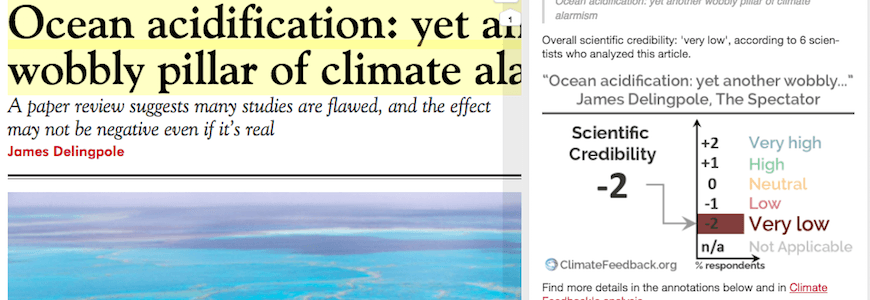By Rob Mitchum // February 7, 2017
Since the 2016 election, there has been much discussion of “fake news” — false stories propagated over social media, usually with a political slant. But climate researchers have been all too familiar with this phenomenon for much longer, pushing back against media reports that push unscientific claims and distorted portrayals of the climate change “debate.” So it’s no surprise that this same scientific community is leading the charge against unreliable science articles, with a new initiative that drafts researchers into volunteer fact-checking.
Climatefeedback.org is a global, non-profit network of scientists that looks for and vets news articles on climate research. The effort’s founder, Emmanuel Vincent of the University of California, Merced, came to the Computation Institute on January 26th to present the concept and results of their work so far. Among the attendees was Forbes contributor Jeff McMahon, who wrote a detailed report on the talk and Vincent’s plan to bring computer science into the mission.
Vincent is a former NOAA and MIT fellow who paused his work on hurricanes to launch Climate Feedback at the Sierra Nevada Research Institute at the University of California Merced.
He told an overflowing crowd at the University of Chicago’s Computation Institute Thursday that his website’s purpose goes beyond fact checking, because there are other forms of misleading information, such as cherry-picked half truths, biased information, rhetorical manipulation, and ill-defined terms.
“I don’t really like this word of fact-checking, but that’s how people understand it,” he said.
Vincent went on to specify that beneath the surface of plainly incorrect facts lies trickier issues, such as half-truths, biased information, rhetorical manipulation, and ill-defined terms. He gave the example of stories that say the Earth is “cooling over the last 2 months” with no context, cherry-picking the data that fits their conceit. Computer science could help, Vincent said, by identifying news topics and verifiable claims, as well as the right domain experts to recruit for a review.
Computers could do the work of scanning the internet for stories, identifying which concern climate change, identifying the specific topic of each (glacial ice, greenhouse gases, polar bears, hurricanes, etc.), and identifying the most relevant expert reviewers, Vincent said.
“The most wrong stories—the ones that are really crazy—are usually not written by journalists,” he said.
For more on climatefeedback.org, visit their website and read about their work in The Guardian and listen to a story from NPR.

